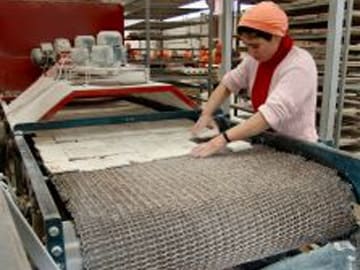
Are Factory Jobs Important to the Economy?
Jobs in manufacturing are somehow superior to those in other sectors to an economic recovery
In the current presidential campaign, the favored photo op for candidates is on the floor of a manufacturing plant—preferably one with a lot of heavy equipment. It's the backdrop for the message that a turnaround in American manufacturing employment (which is occurring, whatever the reason) is essential to the social as well as economic recovery of the country.
This line of reasoning makes several assumptions: jobs in manufacturing are somehow superior to those in other sectors; jobs in the service sector are somehow less essential to an economic recovery (in spite of the fact that such jobs make up more than 80 percent of the employment in developed countries); and that manufacturing jobs beget service jobs. It's a short step to conclude that the decline of the middle class and loss of social fabric, at least in the US, can be traced to a drop in "factory jobs," (a notion that New York Times columnist David Brooks calls simplistic). Andy Grove, an influential leader of Intel for many years, warns that R&D and product development capabilities will be lost along with the loss of such jobs.
While examining the closing gap between developed and developing economies, Nobel Prize economist Michael Spence has taken a somewhat different look at the jobs picture. In his book The Next Convergence, Spence focuses on what he calls tradable jobs (making things like cars that can be made somewhere else—largely manufacturing jobs) and nontradable jobs (like nurses and auto mechanics, the vast majority of whom provide services that are consumed where they are produced). Between 1990 and 2008, the US economy added 27 million jobs. Ninety-eight percent of them were in nontradable activities. This is another way of saying that most American job growth has come in sectors where US workers don't compete against overseas workers. Tradable jobs would have actually declined if the loss of jobs in manufacturing hadn't been offset by new tradable jobs involved in the creation of ideas (for example, consulting and the development of new information technologies, nearly all service sector jobs).
Spence argues in favor of, among other things, public policies regarding infrastructure, technology, and education that seek to bring tradable jobs ("work for middle-income people") back to US shores. One model that he cites is Germany between 2000 and 2005, during which it sought to become more competitive by lowering real wages and putting limits on wage and salary growth in both the public and private sectors while continuing to support an apprentice system.
Service sector research indicates that all developing economies are experiencing increases in the proportion of service sector jobs, while jobs that "make things" shrink toward some small, but probably irreducible, proportion such as 10 percent. Further, in terms of job quality, those employed in factory jobs generally are less safe, use more energy, and pollute more than those in services. With the decline in real wages in manufacturing, many service jobs compare quite well on this dimension as well, although some of these are tradable.
This complicated picture raises several questions: How are priorities for government investment—for example, in education, infrastructure, subsidies to specific industries, an apprentice system—influenced by the kind of jobs a country seeks to stimulate? In thinking about priorities, do we devote too much of our concern to the restoration of manufacturing jobs? Or are the priorities roughly the same for all kinds of jobs? Are factory jobs the key to growth and the restoration of a nation's "social fabric"? What do you think?
This article was provided with permission from Harvard Business School Working Knowledge.





